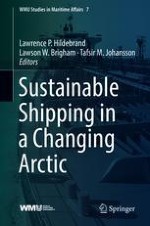2018 | OriginalPaper | Buchkapitel
Arctic Oil Spill Intervention: In Search of an Integrated Approach for the High Seas
verfasst von : Neil Bellefontaine, Tafsir M. Johansson
Erschienen in: Sustainable Shipping in a Changing Arctic
Aktivieren Sie unsere intelligente Suche, um passende Fachinhalte oder Patente zu finden.
Wählen Sie Textabschnitte aus um mit Künstlicher Intelligenz passenden Patente zu finden. powered by
Markieren Sie Textabschnitte, um KI-gestützt weitere passende Inhalte zu finden. powered by
